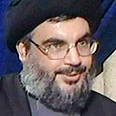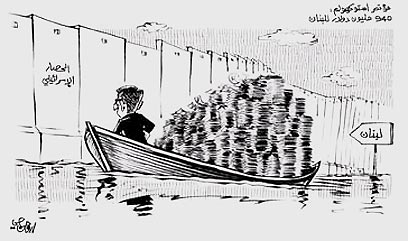
Media: Hizbullah recruiting martyrs' children
In the days following the war in Lebanon, newspapers from the Arab world report that Hizbullah is recruiting children to staff its armed militias; commentators fear a Shiite republic will rise in Lebanon; other slam Hizbullah’s ‘deterrence theory’
Hizbullah's child militias: Egyptian weekly Roz Al-Yusuf reported that Hizbullah has set up armed militias comprised of more than 2,000 children of shahids aged 10-15 and that the Hizbullah-affiliated “Mahadi Boy Scouts” organization is training them to sacrifice their lives.
“Hizbullah took pure children and established armed militias,” the report said. “Prior to the recent war with Israel these children made annual appearances as “December 14 Units” only in the framework of the Jerusalem Day celebrations, but today they are referred to as "future suicides."
“The children wear camouflage army uniforms, paint their faces black and take the Jihad and Holy War oath,” according to the report. “They are chosen by those responsible for recruitment to Hizbullah only because they are the children of shahids.”
The report said that the Mahadi Boy Scouts organization teaches the children Hizbullah and Shiite ideology, adding that their first lesson was titled ‘Israel is a temporary country.’
The weekly said top Hizbullah members have not denied the report.
Naim Qassam, Hizbullah Chief Hassan Nasrallah’s deputy, told Radio Canada that “a nation with suicide children is a victorious one. Israel cannot conquer us or desecrate our lands because we have shahids who will remove the Zionist filth. This will be done with the blood of the suicides.”

Cartoon from A-Nahar: Siniora returns to Israeli-blockaded Lebanon with funds
Islamic Shiite republic? In light of these recent findings it is no wonder that there are those who have expressed fears that Hizbullah will establish an Islamic Shiite republic in Lebanon.
In an article published following the war in Lebanon, Jordanian-American reformist intellectual and researcher Dr. Shaker Al-Nabulsi warned of Hizbullah’s intent to set up such a republic based on the principles of the current Iranian regime.
Al-Nabulsi said the greatest concern relates to the possibility of Hizbullah ideology spreading in the entire Arab world in such a way that there would no longer be a need to ‘export’ Ayatollah Khomeini’s revolution.
The danger to democracy and freedom lies in a possible triumph of Hizbullah ideology rather than in the group’s military accomplishments, he said.
Failure of deterrence theory? With the letup of fighting in Lebanon, the country’s political crisis is worsening and criticism of Hizbullah is taking center stage. Lebanese Interior Minister Ahmad Fatfat slammed Hizbullah and called on his country to examine “the theory of deterrence against Israel” adopted by the terror organization, which in his opinion proved ineffective in the recent war despite his belief that Hizbullah was the victor.
“The most important question we need to ask is where we are going on the strategic plane,” Fatfat said in an interview with A-Sharq al-Awsat. “There are big differences between what was before July 12 and what came after. It is enough the Hizbullah leader Hassan Nasrallah said he didn’t expect such a reaction from Israel. This means that his basic assumptions of deterrence need to be reexamined. Lebanon paid a terrible price due to the deterrence theory. At the same time, no one can deny it was a military victory.”

Cartoon from Al-Quds al-Arabi: Battle between brains and brawn. ‘What did we gain from your gamble?’ the brain asks. ‘The same thing we gained from your brains,’ answers the gun wielder
“Hizbullah fighters were magnificent and stood strong, but the questions that need to be asked are where are we going, and why did Hizbullah not act according to the majority’s opinion before making the decision to go to war? Prime Minister Fouad Siniora met with a top Hizbullah official on July 12 and asked him what happened. After hearing the answer, Siniora said, ‘Israel will go nuts!’ but the official told him, ‘Israel won’t do anything.’ I heard the same thing from a member of Palestinian parliament from Hizbullah, who said Israel’s response would be limited.
While Syria’s President Bashar Assad admits he is considering adopting the Hizbullah model, Fatfat rather suggests that Lebanon adopt the Syrian model and maintain a quiet border with Israel. “There are many alternatives to the ‘deterrence theory.’ I’m not talking about the Egyptian or Jordanian model, that’s to say a peace treaty. We can’t sign a peace treaty, for the simple reason that we have half a million Palestinians in Lebanon and we can’t do a thing before solving their issue, and we won’t be the ones absorbing them. There is the Syrian alternative – the situation in the Golan suits Syria well. A bullet hasn’t been fired there in 32 years.”
Lebanon in the eye of the storm: Things in this vein reflect only one aspect of the issues consuming Lebanon in the days after the war. Some of them will not be voiced to Nasrallah, the Syrians or Iranians. For example, head of the Lebanese internal security staff, General Ashraf Rifi, said his staff had started reassuming the role it lost during the days of the “Syrian custodianship.”
“The (Syrian) mandate prevented internal security forces in Lebanon from dealing with the terror issue and limited their weapons,” he said during an interview with A-Sharq al-Awsat. He said the greatest obstacle his staff faced was equipment.
In the meantime, according to reports, the Lebanese army was deploying in the southeast sector along the border with Israel.
Battle for influence: The hidden battle for operational influence in Lebanon continues between the anti-Syrian front headed by Saad al-Hariri, Walid Jumblatt and Fouad Siniora, and pro-Syrian Hizbullah and its allies. Commentators assessed this week that Siniora’s stance has grown stronger after the donor committee meeting this week in Stockholm, where the Lebanese premier succeeded in recruited USD 940 million – in addition to the aid pledged by Saudi Arabia and Kuwait.
Siniora even announced this week that his government would reward each family whose home was hit USD 33,000 – almost double the sum Nasrallah pledged while he mocked the competence of the Lebanese government.
However, these steps are far from loosening Hizbullah’s grip, which is continuing to act untiringly.
Lebanon's Central Bank Governor Riad Salameh even said this week that the money Hizbullah was streaming to victims of the war came from outside the country. “These monies arrived on ships and were not issued by the Central Bank, were not paid in local currency and did not come from the banking sector. The banking sector must notify if such large withdrawals are being made. I believe this activity is linked to taxing and shipping,” Salameh said in an interview with Al-Ahbar.










